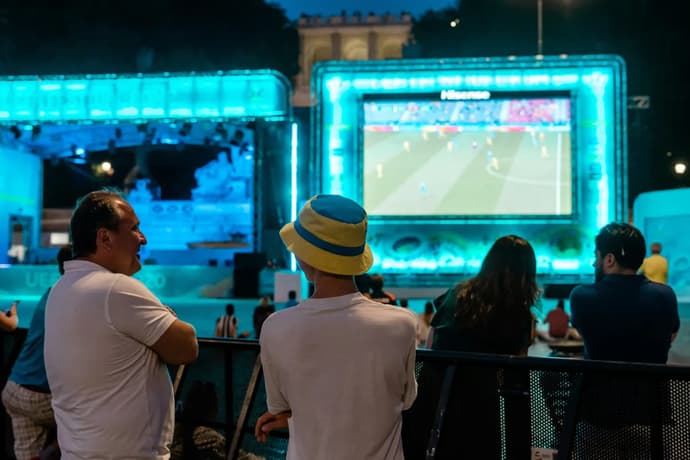
Beyond the Pitch: How Sports and Gaming Cultures Intersect Worldwide

You're seeing something different in the history of entertainment. The distinction between classic sport and gaming culture is vanishing altogether. With more than 3.3 billion global gamers, we're seeing the biggest cultural overlap in contemporary entertainment. So what does it all boil down to for you as a viewer, player, or industry analyst?
The Evolution Into Hybrid Entertainment
The mainstream sports leagues are not on the sidelines anymore. Major League Soccer teamed up with EA SPORTS in 2025 to mark what they refer to as "the intersection of sports fandom and culture" at places like New York's Whitney Museum. This is a paradigm shift in how sports leagues conceptualize their fanbase.
You'll discover that 2025 is the year that college esports programs came of age at last. Colleges and universities have graduated from the early days of gaming labs to establish full-fledged microcredentialing programs and standalone esports degrees. The University of Cincinnati's undergraduate degree in games and animation is only one measure of how institutions are responding to this convergence.
The figures are testament enough. The international sports betting market grows at approximately 10% per annum from 2025-2030, and esports viewership keeps breaking records even when the best streamers co-stream sanctioned esports; viewership is typically twice that of broadcast in isolation.
Cultural Fusion Across Borders
This is where it gets most thrilling for you: gaming has made the playing field of world sporting participation simpler. You don't require expensive gear, professional training facilities, or even a location near large cities in order to play at a global level. A teenage rural Thai can match professional players from big cities, and they're using the same language, the global language of competitive gaming.
Influencers and creators are creating their own esports teams, but they're not the kind of traditional sports franchises. They're constructing personality-driven, story-driven, fan-relationship-driven brands. They're entertainment companies before they are competitive teams. And it's worth it. Fan engagement is typically 200-300% higher than that of traditional sport franchises.
But there are strong regional variations in the way that this convergence manifests itself. Consumers in Europe prefer simulation-based sports games that most closely replicate the rules of the actual world, while Asian consumers prefer fantasy-based games with fresh sets of rules. North American consumers take an intermediate position, preferring both approaches depending on the sport involved.
The Regulatory Reality Check
The regulatory environment is an absolute patchwork. In the first half of 2025 alone, states such as Illinois, Louisiana, Maryland, and New Jersey each raised taxes on sports betting and ancillary gaming activities. Tax rates of as much as 15% have been implemented by some jurisdictions on internet sports betting operations.
This imbalance in regulation is a legitimate concern. If your local council limits access to specific forms of sports-gaming activity, you're then left trying to circumvent this. Many fans turn to foreign casinos and offshore platforms that offer broader access to international competitions and betting markets. While entry is thereby assured, it raises new problems regarding regulatory compliance and customer protection.
Various nations responded differently to this convergence. Costa Rica legalized sports betting back in 2020, but continues to exert tight control over the market. Colombia went a step further and legalized internet betting and started issuing licenses, opening the market still further. Others have prohibited sports betting outright, compelling their people to find it elsewhere.
Technology as the Great Equalizer
Mobile gaming certainly qualifies to be mentioned here as it's actually transforming the way you engage with sports culture. Smartphone usage has brought competitive gaming to billions of individuals who never had access to conventional sports facilities. You can play FIFA tournaments, NBA 2K leagues, or racing competitions on your phone alone.
Virtual and augmented reality platforms are developing ever more immersive experiences. You can now see it as the quarterback does, break down plays in real-time, or even step onto the field alongside professional players in mixed reality spaces.
The overlap of esports and conventional sports streaming has enabled us to see completely new types of viewing experiences. When Riot Games enables League of Legends and Valorant tournaments to be co-streamed with vetted creators, they're not actually scaling reach; they're changing how you view sports entertainment.
What's Coming Next
The sector is coming out of what analysts described as the "esports winter" of 2023, and 2025 appears to be the start of a fresh growth period. You are witnessing deeper usage by traditional sporting bodies, more advanced technology platforms, and smarter regulatory frameworks in a lot of jurisdictions.
But there are obstacles. Maintaining authenticity in large numbers globally isn't easy. How do you maintain the underground culture that made gaming so valuable when you're serving mass market sports fans? How do you plug the regulation loopholes that currently drive consumers toward less regulated alternatives?
The convergence of sporting and gaming culture is the formation of a new community, competition, and culture. As a sports nut wanting to dip into the world of gaming or a gamer looking to dip into the world of sports, you're riding the biggest entertainment revolution in contemporary history. It's just a matter of how you get involved.

Kateryna Prykhodko is a creative author and reliable contributor at EGamersWorld, known for her engaging content and attention to detail. She combines storytelling with clear and thoughtful communication, playing a big role in both the platform’s editorial work and behind-the-scenes interactions.
 How To Craft in Hytale: Recipes You Need For BeginningA complete guide to Hytale Crafting. Learn pocket crafting, workbenches, and all the essential recipes to get started.
How To Craft in Hytale: Recipes You Need For BeginningA complete guide to Hytale Crafting. Learn pocket crafting, workbenches, and all the essential recipes to get started.
 All Hytale Workbenches: Their Crafting RecipeThis guide covers all Hytale workbenches, their uses, and the complete crafting recipes needed to build them. From basic survival to advanced alchemy, get started.
All Hytale Workbenches: Their Crafting RecipeThis guide covers all Hytale workbenches, their uses, and the complete crafting recipes needed to build them. From basic survival to advanced alchemy, get started.
 Valorant Competitive Map Pool 2026: What You Need to KnowExplore the 2026 Valorant Competitive Map Pool with Abyss, Bind, Breeze, Corrode, Pearl, Haven, and Split. Learn why Sunset was removed and how Riot updates maps for ranked play.
Valorant Competitive Map Pool 2026: What You Need to KnowExplore the 2026 Valorant Competitive Map Pool with Abyss, Bind, Breeze, Corrode, Pearl, Haven, and Split. Learn why Sunset was removed and how Riot updates maps for ranked play. CS2 Rising Stars: Which Players Will Shine in 2026?Which CS2 players will shine in 2026? Pro stars share bold predictions on the most promising young talents ready to break into the elite Counter-Strike scene.
CS2 Rising Stars: Which Players Will Shine in 2026?Which CS2 players will shine in 2026? Pro stars share bold predictions on the most promising young talents ready to break into the elite Counter-Strike scene.


